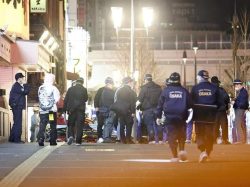Japan Nationality Recognized for Child of Afghan Refugees; Court Rules Parents Were Stateless When Child Was Born

The building that houses the Nagoya High Court is seen in November 2020.
6:00 JST, September 13, 2024
NAGOYA — The Nagoya High Court has ruled that a child born to Afghan refugees can have Japanese nationality, overturning a family court decision.
The high court on Wednesday overturned the decision by the Toyohashi branch of the Nagoya Family Court and ordered that a 1-year-old girl whose parents fled Afghanistan be allowed to create a new family register in Japan. According to the girl’s attorney, this appears to be the first time that a child whose parents are Afghan natives has been permitted to be registered in a newly created family registry.
Presiding Judge Yasuhiro Hasegawa said that although the Taliban Islamic fundamentalist group invaded Kabul and declared it had taken power in September 2021, the group lacks the requirements to be a nation, and it has not been recognized by other countries, including Japan.
When the girl was born in Aichi Prefecture in 2022, her parents had no nationality, Hasegawa said.
The Nationality Law stipulates that a child who was born in Japan and whose parents are stateless is a Japanese national. Given that, the court accepted the plaintiff’s demands.
According to lawyer Yasuyuki Nagai, the girl’s parents have been recognized as refugees and currently have the status of “long term residents” along with their daughter.
The number of Afghan people with refugee status was 147 in 2022 and 237 in 2023, according to the Immigration Services Agency.
“There are other displaced people who have been in the same situation,” Nagai said. “[This ruling] has paved the way for the children of such people to be able to live as Japanese nationals.”
Top Articles in Society
-

Man Infected with Measles Reportedly Dined at Restaurant in Tokyo Station
-

Man Infected with Measles May Have Come in Contact with Many People in Tokyo, Went to Store, Restaurant Around When Symptoms Emerged
-

Woman with Measles Visited Hospital in Tokyo Multiple Times Before Being Diagnosed with Disease
-

Australian Woman Dies After Mishap on Ski Lift in Nagano Prefecture
-

Foreign Snowboarder in Serious Condition After Hanging in Midair from Chairlift in Nagano Prefecture
JN ACCESS RANKING
-

Japan PM Takaichi’s Cabinet Resigns en Masse
-

Japan Institute to Use Domestic Commercial Optical Lattice Clock to Set Japan Standard Time
-

Israeli Ambassador to Japan Speaks about Japan’s Role in the Reconstruction of Gaza
-

Man Infected with Measles Reportedly Dined at Restaurant in Tokyo Station
-

Videos Plagiarized, Reposted with False Subtitles Claiming ‘Ryukyu Belongs to China’; Anti-China False Information Also Posted in Japan





















